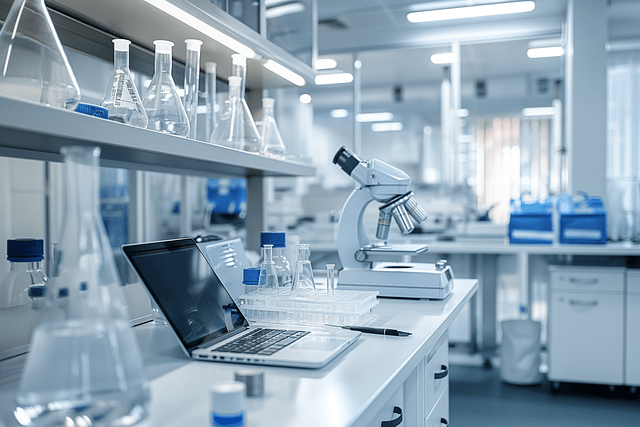
Is artificial intelligence a boon or a bane—or perhaps a bit of both?
Just a few years ago, discussions about artificial intelligence (“AI”) were mostly confined to science fiction movies and TV shows. However, the landscape changed dramatically when ChatGPT, a generative AI model from OpenAI, gained mainstream recognition in 2022. Since then, AI has permeated nearly every industry worldwide and biotechnology is no exception.
Take BioGPT, for example—a generative language model trained on millions of biomedical research papers. It’s assisting experts in answering complex questions, extracting valuable data and generating text related to biomedical research.
In this blog, we’ll break down the impact of AI in biotechnology research. By reading, you’ll discover how this cutting-edge technology is redefining drug discovery, data analysis and decision-making for biotech companies.
How AI Is Revolutionizing Pharmaceutical and Biotech Research

As a firm that works closely with innovators in life sciences and medical technology, we are closer to the action than the average observer. What we’re witnessing represents groundbreaking advancements that far outpace any rate of change healthcare has previously experienced. Here are some of the ways AI technologies are propelling the biotechnology industry forward:
AI-Assisted Drug Discovery
There’s no denying that drug development is an inherently complex, expensive and lengthy process. On average, biotech and pharma companies take between 10 to 15 years to develop a new drug.
Enter AI—a technology poised to change the game. Industry estimates suggest that biotech companies will spend more than $3 billion on AI-driven drug discovery by 2025. Here’s how companies are using AI to boost the drug discovery process:
- Exscientia: An Oxford-based AI drug discovery firm credited with developing the world’s first AI-designed cancer therapy drug, which entered clinical trials in early 2020 but was later discontinued.
- Insilico Medicine: A Hong Kong-based company that created Chemistry42, a proprietary drug discovery platform that accelerates the process of determining new drug candidates.
- Recursion Pharmaceuticals: Based in Salt Lake City, Utah, this company used its AI-assisted drug discovery platform to target treatment for solid tumors for lymphoma, match it with a drug candidate and gain FDA approval for clinical trial in under 18 months.
Personalized Medicine
Personalization has become a central theme in many industries, including healthcare. This has led to the rise of personalized medicine, also known as precision medicine. In simple terms, it’s the customization of medical treatments, prevention strategies and predictions based on an individual’s unique characteristics.
As you may have inferred, the field of personalized medicine is dependent on efficient patient data analysis. Recently, the incorporation of machine learning has helped medical professionals overcome challenges in this area. Notable examples include:
- Celcuity: Uses machine learning models to develop new targeted therapies for cancer patients.
- InsightRX: This company offers a precision dosing platform that uses machine learning and other quantitative methods to improve drug dosing practices.
- xDecide: An AI platform developed by xCures, a company focused on using AI to optimize healthcare records. The clinical decision support system, accessed through a web portal and powered by a human-AI team, helps oncologists offer personalized treatment for advanced cancer patients. xDecide can generate structured personal health records, standardize clinical-genomic features and produce ranked treatment options based on clinical insights, expert analyses and real-world outcomes.
Medical Imaging
Medical imaging forms a crucial component of biomedical research. AI models are now being used to improve image interpretation and imaging, detecting subtle changes and abnormalities that may be difficult for the human eye to discern.
Today, AI algorithms assist in the early detection of breast cancer on mammograms, identifying lung nodules on CT scans and recognizing signs of Alzheimer’s on MRI scans. Moreover, new AI technologies are being used to analyze echocardiograms, helping technicians diagnose heart disease more accurately.
Predictive Analytics
AI algorithms can analyze data from various sources to identify individuals at risk of developing certain diseases. Typical sources include:
- Electronic health records
- Genomics
- Wearable devices
- Social media trends
- Pharmacy records
- Medical imaging
- Lab test results
- Population health databases
For instance, in February 2023, scientists from the University of Virginia built an AI-powered online tool to track the spread of infectious diseases in low- and middle-income countries. The tool pulls data from various sources and predicts hotspots where diarrheal diseases are likely to occur.
Challenges of Using AI Technologies for Biotechnology Research

There’s no denying the immense potential for AI to revolutionize biotechnology research and impact human health positively. However, as with any emerging technology, several challenges need to be addressed as we move into an AI-focused era:
Lack of Talent
Although AI technology has been around for over a decade, the recent boom has led to unprecedented growth in this field. However, human expertise hasn’t fully caught up with this rapid expansion. According to a recent report, there’s a significant shortage of professionals skilled in the latest AI technologies.
To bridge this talent gap, companies are investing in training programs and partnerships with academic institutions to cultivate the next generation of AI experts in biotechnology.
Regulation and Compliance Issues
The AI industry is evolving rapidly, creating a pressing need for experts to collaborate closely with regulators to ensure the safe and ethical use of AI in biotechnology research. Recently, the U.S. Food and Drug Administration (“FDA”) and the European Medicines Agency (“EMA”) released discussion drafts and reflection papers to initiate conversations among stakeholders regarding the adoption of AI and machine learning in drug development.
Cyber Threats
Data is the fuel that powers AI technologies. Unfortunately, the rise of AI and its adoption in biomedical research have led to increased cyberattacks against companies that store and process valuable patient data. Common AI-assisted cyberattacks against life sciences and other technology companies include:
- Phishing and Spear Phishing Attacks
- Deepfake Attacks
- Ransomware Attacks
- Data Exfiltration
- Supply Chain Attacks
- Automated Vulnerability Exploits
- Insider Threat Detection and Evasion
- Advanced Social Engineering
It’s essential for organizations to revamp their data protection strategies and stay abreast of current trends in the cybersecurity landscape. Implementing robust security measures, conducting regular vulnerability assessments and fostering a culture of security awareness can help mitigate these risks.
Contact Crowley Law LLC
In the weeks ahead, we invite you to join us in conversation and exploration as we dissect AI’s impact on the fields of biotechnology and life sciences. We encourage inventors and legal counselors to continue this critical dialogue in a way that’s productive and applicable to all stakeholders.
Crowley Law LLC celebrates advances in science and technology that can lead to improved quality of life for millions of patients. With Crowley Law’s experience in biotech and AI, we are uniquely positioned to help those companies that are using AI in life sciences to protect their IP and successfully commercialize it. If you are pursuing development in the life sciences or other technologies and are wondering how to best move forward, contact us at [email protected] or (908) 540-6901 to arrange for a discussion with one of our team members.
We’re here to help.
FAQ
How Can AI Technology Benefit My Biotech Company?
Here are some benefits of AI technology for biotech companies:
- Accelerated decision-making: AI models can analyze large datasets to identify potential drug candidates faster, reducing your R&D costs.
- Predictive analytics: AI models can predict patient responses to treatment and this can help improve clinical trial outcomes.
- Personalized medicine: AI can help design treatments tailored to patient data which can make therapies more effective.
- Process automation: AI can automate routine tasks like data entry, sample analysis and equipment calibration.
What Legal Considerations Should I Be Aware of When Implementing AI in Biotech Research?
- Data privacy and security laws: If your firm handles sensitive data, you must comply with regulations such as the Health Insurance Portability and Accountability Act and the General Data Protection Regulation.
- Intellectual property (“IP”) rights: You must clarify the ownership of AI-generated inventions and data, especially when collaborating and partnering with other companies.
- Algorithm accountability: You must establish clear accountability for decisions made by AI algorithms.
- FDA Regulations: AI-driven medical devices and diagnostic tools should comply with FDA guidelines.
How Can I Protect My Company From AI-Related Cyber Threats?
- Implement robust cybersecurity measures
- Conduct regular security audits
- Train your workers to recognize phishing attacks, malware and social engineering tactics
- Implement robust access controls
- Maintain regular backups of critical data
- Have a clear incidence response plan in case of a cyberattack








